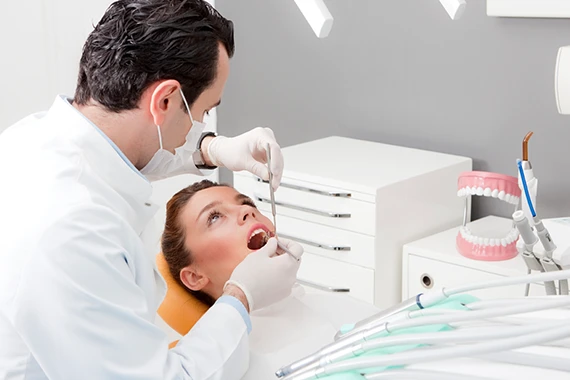Is Dental Crown Removal Painful?
Dental crowns are mostly used to restore damaged or weakened teeth, providing strength, protection, and aesthetics. However, there are times when a crown may need to be removed due to various reasons, such as decay, damage, or the need for replacement. If you’re facing the prospect of getting a crown removed, you might be wondering, “Is dental crown removal painful?”.
Keep on reading to explore the procedure of crown removal, understand the factors that can influence pain levels, and get insights into what to expect during and after the removal process.

Understanding Dental Crowns and Their Importance
Dental crowns play an essential role in restorative dentistry, offering solutions for damaged, weakened, or aesthetically compromised teeth. They are custom-made caps that cover the tooth above the gum line, restoring its shape, size, strength, and functionality. Crowns are made up of durable materials such as porcelain, metal, or a combination of materials, ensuring long-lasting protection and natural-looking results.
The importance of dental crowns lies in their ability to:
- Restore Tooth Structure: Crowns are utilized to repair teeth with significant decay, fractures, or large fillings, providing structural support and preventing further damage.
- Protect Weak Teeth: Teeth weakened by root canal therapy, trauma, or excessive wear can be strengthened and protected with crowns, reducing the risk of fractures or breakage.
- Improve Aesthetics: Crowns can enhance the appearance of teeth by correcting discoloration, shape irregularities, gaps, or alignment issues, resulting in a more uniform and pleasing smile.
- Support Dental Bridges: Crowns serve as abutments for dental bridges, anchoring them securely in place to replace missing teeth and restore bite function.
- Cover Dental Implants: Dental implants, which replace missing teeth, are topped with crowns to replicate natural tooth appearance and function seamlessly within the smile.
Reasons for Crown Removal
Several reasons may necessitate the removal of a dental crown:
- Decay: If decay develops beneath the crown or at the margin where the crown meets the tooth, removal may be necessary to address the decay and protect the underlying tooth structure.
- Damage: Accidental trauma or wear and tear over time can cause damage to the crown, such as cracks or fractures, requiring removal and replacement.
- Infection: In some cases, infection or abscess may develop near the tooth with a crown, necessitating removal to treat the underlying infection.
- Replacement: Over time, dental crowns may need to be replaced due to wear, changes in bite alignment, or aesthetic reasons.
Is Dental Crown Removal Painful?
The process of crown removal is typically not painful, as the tooth and surrounding area are numbed using local anesthesia. The dentist will make sure that you are comfortable throughout the procedure. The sensation during crown removal is often described as pressure rather than pain. You may feel some slight tugging or pressure as the crown is gently loosened and lifted off the tooth.
The Crown Removal Procedure
The dental crown removal procedure is as follows:
Anesthesia:
Your dentist will start by administering local anesthesia to numb the tooth and its surrounding tissues, ensuring a comfortable and pain-free experience during the crown removal process.
Crown Removal:
Using specialized dental tools, your dentist will gently and precisely remove the crown from the tooth. This involves carefully cutting through any dental cement or adhesive that secures the crown in place.
Tooth Examination:
After the crown is removed, your dentist will thoroughly examine the underlying tooth for signs of decay, damage, or other issues that may require further treatment or intervention.
Temporary Protection:
In certain cases, your dentist may place a temporary crown or protective covering over the tooth to safeguard it until a permanent restoration, such as a new crown, can be custom-made and placed.
Treatment Planning:
Based on the condition of your underlying tooth and your unique dental requirements, your dentist will discuss suitable treatment options with you. These options may include a new crown, dental filling, or other necessary dental procedures to restore and maintain optimal oral health.
Post-Crown Removal Care and Recovery
Following the removal of a dental crown, it’s common to experience mild sensitivity or discomfort, especially if the underlying tooth underwent treatment. Your dentist may suggest using over-the-counter pain relievers and provide specific care instructions to support healing and enhance comfort during recovery.
Factors Influencing Pain Levels
While the process of crown removal is typically not painful, several factors can influence the level of discomfort or sensitivity that individuals may experience:
- Individual Pain Threshold: Pain tolerance varies among individuals, so what one person perceives as discomfort may differ from another’s experience.
- Underlying Tooth Condition: If additional dental procedures such as fillings or root canal therapy were required for the underlying tooth, there may be some post-procedural discomfort.
- Dental Anxiety: Fear or anxiety related to dental procedures can contribute to heightened perceived pain levels. Sharing any concerns openly with your dentist can help reduce anxiety and guarantee a more comfortable experience during and after crown removal.
Conclusion
Is dental crown removal painful No, the process of getting a crown removed is not painful, thanks to advancements in dental techniques and the use of local anesthesia. While some individuals may experience mild discomfort or sensitivity during or after the procedure, proper post-removal care and following dentist-recommended guidelines can help alleviate any temporary discomfort.
For expert dental care and pain-free crown removal procedures, schedule an appointment with Prime Family Dentistry in Stone Ridge, VA. Book your appointment online. New patients can call at (703) 214-9126, and existing patients can call us at (703) 957-3536. Trust our experienced team to provide gentle and effective dental care tailored to your needs.
FAQ
Is crown removal a painful procedure?
Crown removal is typically not painful due to the use of local anesthesia to numb the tooth and surrounding tissues.
How long does it take to recover after crown removal?
Recovery time varies, but most individuals experience mild discomfort or sensitivity that resolves within a few days to a week with proper care.
Can I eat normally after getting a crown removed
It is advisable to stick to softer foods initially after crown removal to avoid discomfort. Gradually reintroduce normal eating habits as advised by your dentist.

